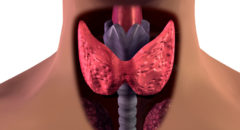
It’s January. You’re feeling sluggish. Your hair isn’t looking its best, and you feel like you’re fighting a double battle between wintertime weight gain and seasonal blues. All these things are normal, right? Perhaps, but your problems could be from a little gland you may never think about – your thyroid.
The thyroid gland, butterfly-shaped and found in the lower front of the neck, makes hormones that are carried to every part of your body by your blood. Thyroid hormones help you use energy, control your body’s temperature and help your organs stay on track and working well. According to The American Association of Clinical Endocrinologists, at least 30 million Americans have a thyroid problem, with half not knowing anything is wrong.
MUST READ: Can Thyroid Problems Affect Your Eyes?
The experts at NurseWise, a national multilingual nurse triage and health education provider, have five signs that you may be one of those 15 million for Thyroid Awareness Month:
1. Less-than-luxurious locks? Winter dry air is a killer for both your skin and hair. But if you’ve noticed your hair falling out, you can’t stop scratching your skin or your nails are more brittle than normal, the problem may be more than the amount of humidity in the air but the amount of thyroid hormone in your blood. Make an appointment to talk through this with your healthcare provider.







